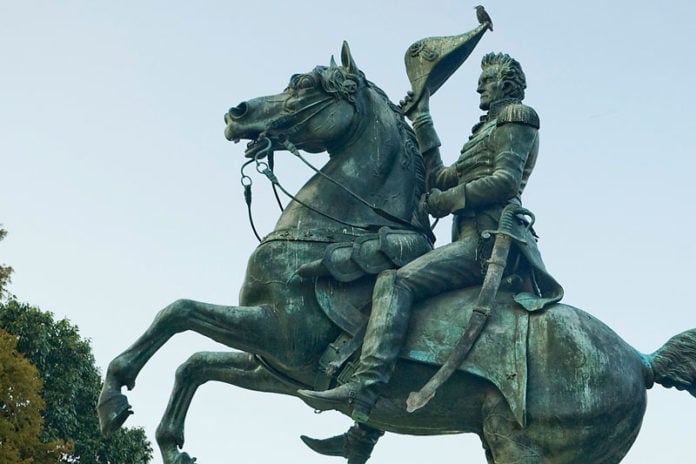When Politico Magazine recently asked historians what figure in America’s history compared to the mythos of Donald Trump, answers ranged from Henry Ford to William Randolph Hearst. Yet, there is one historical comparison these experts missed – Andrew Jackson.
Jackson and Trump could not have come from more different backgrounds – Jackson, a gruff war hero and “Man’s man” from humble upbringings in a remote part of the Carolinas, and Trump, who was raised in New York City among great wealth and opportunity. Both men, however, developed a shared appetite for adversarial confrontations with “enemies,” and a distaste for “authorities” who dared stand in their way.
Neither man was known for cool headedness, particularly when it related to personal attacks. Fancying himself a frontiersman, and living in the days where disputes often were settled by duels, Jackson is said to have kept 37 pistols at-the-ready for such occasions. Though not all of Jackson’s alleged 100+ duels ended in shots fired (duels most often were tests to see which man “backed down” first, rather than as the fatal shootings portrayed in Hollywood Westerns), Jackson did kill at least one opponent who called him a coward, and took a bullet to the chest in the showdown.
Trump, the city-slicker, has chosen to hold his “duels” in court, and is known for his incredibly litigious nature, especially involving slights or so-called “defamations” against his or his family’s character. Trump’s threats of libel lawsuits have become so comically frequent, a website was setup to track the number of days since his last threat against a critic.
Such confrontational attitudes also influenced how each of these men approached public policy.
Neither Jackson nor Trump are men to whom the word “No” applied when pursuing their agendas. For instance, when South Carolina attempted to nullify federal laws during Jackson’s Administration, he threatened to use military force against the state in order to get his way. And, when the Supreme Court issued a ruling on Native American inhabitants with which Jackson disagreed, he simply ignored the ruling. “[Supreme Court Justice] John Marshall has made his decision, now let him enforce it,” Jackson famously declared; throwing a verbal gauntlet at the feet of the distinguished Chief Justice and his colleagues. The flouting of the Court’s ruling would lead eventually to the forced and tragic removal of Indians from southern lands, in what would become known as the Trail of Tears.
Trump, too, has shown little regard for limitations when it comes to outlining his vision for being President. Even though doing so would grant enormous (and likely unconstitutional) law enforcement power to federal and local authorities – not to mention astronomical costs – Trump repeatedly has stated plans to deport all illegal immigrants in the United States. Trump also has threatened punitive repercussions against CEOs who dare disobey his declaration that no American companies would be permitted to move their businesses outside the US without paying a heavy price.
Both men view Executive power as a tool to be wielded whenever necessary, and to whatever extent necessary, to implement and preserve their vision for law and order. This, too, may explain why both men used their positions of power and influence to expand their personal empires; Jackson through bribery and coercion to acquire real estate, and Trump through eminent domain and cash donations to politicians at all levels of government.
The striking similarities are reflected also in how both men see themselves — as anti-Washington “men of the people.” Jackson, for example, dismantled the Second Bank of the United States, which he saw as an unchecked tool of the privileged to oppress commoners. Trump, too, speaks to problems of the working class, and has made this populist rhetoric the centerpiece of his campaign against the Establishment; notwithstanding his life-long membership in that very Club.
Where Trump whines incessantly about battling a “rigged” system, Jackson actually lost his first try for the presidency in 1824 in what some might call a “rigged election.” The problem faced by Jackson was that, in a four-way race, he won a plurality but not a majority of electoral votes in the general election, but when the decision then went to the House of Representatives to decide the final winner, John Quincy Adams won. Like Trump, Jackson never forgot or forgave a slight; and the anti-establishment fervor he and his supporters stoked over the next four years led to his victory four years later.
After nearly two centuries, the restless soul of “Old Hickory” appears to have found a new host; one with access to money and levers of power Jackson could hardly have imagined.





























